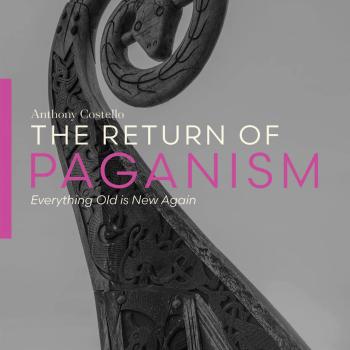In late September, Pastor Andy Stanley hosted the Unconditional Conference at his church, Northpoint Community Church in Alpharetta, GA. This conference was organized by a group called Embracing the Journey, an organization characterized by the seemingly Christian values of teaching parents how to love and care for their LGBTQ+ children. The mission statement of Embracing the Journey reads as follows:
To build bridges between LGBTQ+ individuals, their families, and the church, not in spite of the bible but because of the bible, drawing parents and children into a deeper relationship with each other and vertically with God
“Embracing the Journey Website” (emphases added).
That this conference was hosted at Andy Stanley’s church, a mega-church with nearly 40,000 attendees is very telling. Pastor Stanley has been on a steady path in recent years away from bedrock Christian values and toward establishing an LGBTQ+ affirming church. He has publicly stated that we as Christians need to “unhitch” from the mores of the Old Testament, thereby distancing himself from the standards of difficult passages of the Bible which deal with homosexuality. He has shared his stage with same-sex couples, putting his arms around lifestyle choices that are in contravention to Biblical truths. Speaking at the Unconditional Conference and in other forums he has stated that homosexuality is not a behavior but a defining attraction, a condition, even a disability.
Stanley and Sin
These observations merely set the background, and many authors have written on the topic of Andy Stanley and his church. Christianity Today, the Christian Post, and many others have commented on the conference and Andy Stanley’s viewpoints. Some Christians with a public voice have even called him a heretic and asked believers to leave his church. Whether he is a formal heretic or not is not the point of discussion here. Instead I will examine theologically and philosophically the danger of making concessions to culture given God’s standards.
Perhaps the best starting point for this discussion is to determine what is the nature of sin and whether that concept holds any weight today. The Biblical definition of sin is departure from God’s standards as outlined in the law. The law is given to us in the Scriptures which are God’s Word and His words. That not all of the laws given in the Old Testament remain in place for the lives of Christians today is evidenced in several places of the New Testament, most notably in Peter’s vision of unclean foods, and in passages such as Rom 3.20-26 and Heb 8.10-12. So we recognize the moral law of God remains intact today even if believers are no longer bound by the ceremonial and civil law codes of Old Testament Israel.
Stanley and God’s Moral Law
That the moral law of God remains the standard for living is evidenced by those passages which point out the role of the law. While Christ came not to abolish the law but to bring it to its highest expression, God’s grace and forgiveness have taken the place of the sacrificial law, rendering those practices unnecessary in the life of the believer. Additionally God’s moral law points out our sin and becomes the standard by which we are judged. The ceremonial laws were a reminder of God’s nature and His moral law. Today, Jesus’s crucifixion replaces that reminder.
Millard Erickson states:
That we cannot in ourselves fulfill the law and thus be justified by it does not mean, however, that the law is now abolished. Not only the reception of righteousness but also the continuance of the Christan life is by grace, not by works which fulfill the law. And yet Christians are nonetheless to regard the biblically revealed law as an expression of God’s will for their lives, for, as we have seen, the law has not been abolished.
Christian Theology, 990.
Thus, the reader of the New Testament and the believer today encounter God’s law as the standard for righteousness. Quickened by the Holy Spirit, we realize we cannot follow God’s law on our own, and this leads them to accept Christ’s Atonement for salvation.
Yet a tightrope remains to be walked: God still calls us to walk in a manner which fulfills His moral law and enables us to do so by the presence of the Holy Spirit in our lives. Sin therefore is failing to follow God’s moral law, and several passages present us with lists of activities which violate that standard (Eph 5.3-4; Gal 5.19-21; Col 3.5-8). It is unequivocal that homosexuality is one of those violations of the moral law and so it must be considered sin. Unrepented sin removes the individual from God’s presence, both in this life and, ultimately, the one to come.
Finding The Balance
Here we encounter the difficulty which Pastor Stanley faces as do many. We must uphold God’s moral standards: we must declare that sin is sin. Yet, our society today has become distanced from a simple understanding of absolutes as personal meaning and identity have become the only standard for morality. Postmodernism, heralded by French philosophers like Jean-Paul Sartre and Jean-Francois Lyotard, is summed up by this basic claim: no universal claims need apply. (Of course, one immediately sees the logical problem here).
For the postmodernist, the only meaning in life is the meaning one personally constructs, so my truth does not ever have to be like yours, or anyone else’s, and my imagined identity can trump my actual biology. When universal truth and moral values have lost their meaning, society runs amok. After all, where does moral construction end if the human imagination is morality’s only source?
Yet it is clear that our society has not abandoned all universals. Our criminal law is based on standards of living for society and most people still follow those laws. The recent film, The Purge, provides a thought experiment: all laws are suspended for one 24-hour period, resulting in anarchy and mass murder. If our society truly believed no absolute values applied, every day would be like The Purge. But that is not how we live. Another example: give one homeless person a dollar and the one standing next to him ten dollars. Will the first not object, appealing to a sense of fairness? Would he be right to do so? This appeal is made on the basis of an inherent human condition, one that feels the standards of fairness and justice should be universally applied.
Yet no one can live in a way that perfectly embodies the moral law to which Christians believe we should all adhere. Departure from universal moral values is sin. That we struggle to live without sin should be clear and obvious to any observer of the human condition. True, some optimists about human nature insist that humans are inherently good; but clearly we are not. Human beings are self-serving from day one: we are slaves to original sin. Ultimately, it is sin which keeps us from following the moral law that is, in truth, written on our hearts and minds: the law of God’s universal moral principles.

Original Sin, Imparted to Us All
St. Augustine, in pointing to the origin of sin, stated that the first sin was not the act of eating the fruit. Rather it was the pride in the heart of Eve as she chose to put her choices over God’s directives (City of God, Book XIV, CH. 14). We could go further to say the first sin was more than that of pride, it was self-worship. When the tempter (Hb. nachash) comes to Eve, he convinces her that she too can be “like God.” When we believe we can become like God, we worship ourselves instead of God. This makes our personal standards the only ones which apply to us. We choose to become our own creators, or, as Sartre put it: existence precedes essence.
Andy Stanley knows all about absolute truth and God’s moral law. As the inheritor of his father’s, Charles Stanley legacy, he has read the Bible from the time he was a child. As the pastor of an enormous church, he preaches to an audience of millions (including online). Therefore, he is accountable before God.
While Stanley continues to say he believes marriage is between and man and a woman and has even called homosexuality sin, in practice his message is confusing at best, especially given his clear affirmation of the homosexual lifestyle and same-sex marriage. He seems to believe he can hold on to his more conservative listeners by talking about Christian values, while at the same time welcome liberal viewers by his acceptance of LGBTQ+ lifestyles. But this is simply serving two masters: the Bible and the culture, God and man.
This cannot be done.
On Love and The Law: Is Andy Stanley a Heretic?
Is Andy Stanley a heretic? That is a strong accusation, perhaps too strong to be made here. However, he is certainly departing from the basis of Scripture as our authority and in so doing is leading others astray. Al Mohler, president of Southern Baptist Theological Seminary accurately stated that Stanley’s message represents a “departure from historic, normative, biblical Christianity.”
Mohler goes on say:
I think both sides understand this is the most basic disagreement we could imagine, so are sex and gender. It’s over ontology and being; it’s over Scripture, the authority of Scripture, and the interpretation of Scripture. It’s over God and the Gospel. It just doesn’t get any more basic than this.
Mohler, “The Briefing”
In another article, same-sex attracted and chaste (a word Stanley flippantly refers to as “old-fashioned”) Christian pastor Sam Allberry writes about Stanley’s problematic engagement with God’s moral law and how his confusing message actually tempts the man or woman of faith:
But to accept that a biblically prohibited relationship is permissible—or the least-bad way forward—is to contradict the biblical sexual ethic Stanley affirmed in this very sermon. I have always been single. On the whole, it has been deeply joyous. But I am not immune from temptation, and when any leader suggests to me that chaste obedience to Christ in singleness is not sustainable, he is saying the very same thing to me that the Devil says.
Sam Allberry, “Andy Stanley’s ‘Unconditional’ Contradiction“
Andy Stanley may be attempting, from the most gracious position possible, to love and accept sinners in order to bring them to a knowledge of God. Yet, his message is endorsing an unbiblical way of life and fails to call sin what it is. He is either unwilling to uphold God’s moral law and is compromising his calling to lead others in the truth or is willing to gloss over the moral law in the (misguided) hope of bringing sinners into contact with Christ (something even Christ Himself did not do). Either way, his adherence to the Scriptures, it would seem, is far from unconditional.













